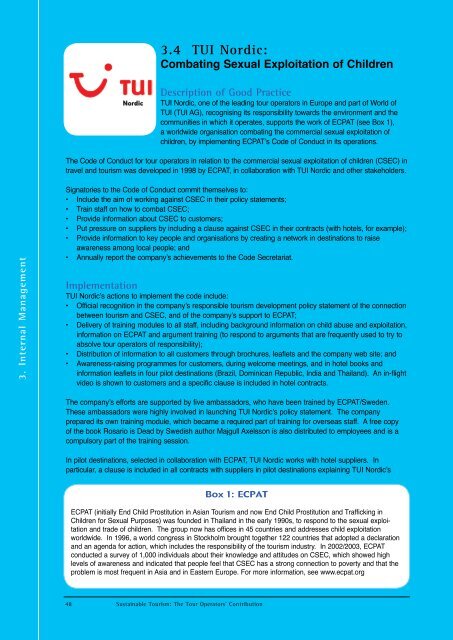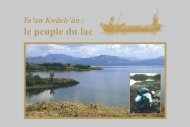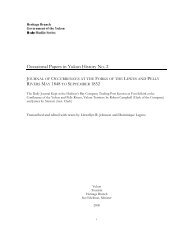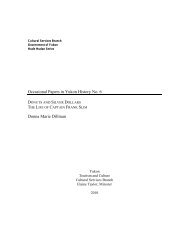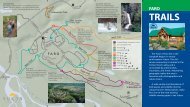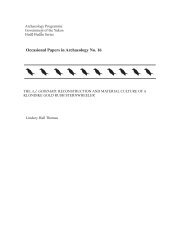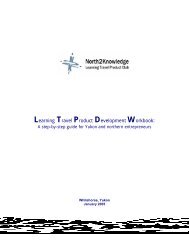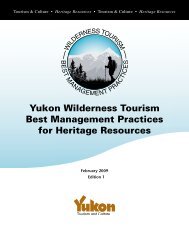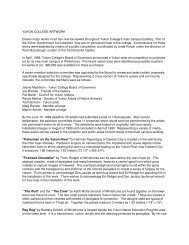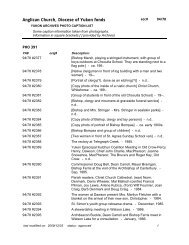Sustainable Tourism: The Tour Operators' Contribution
Sustainable Tourism: The Tour Operators' Contribution
Sustainable Tourism: The Tour Operators' Contribution
You also want an ePaper? Increase the reach of your titles
YUMPU automatically turns print PDFs into web optimized ePapers that Google loves.
3. Internal Management<br />
3.4 TUI Nordic:<br />
Combating Sexual Exploitation of Children<br />
Description of Good Practice<br />
TUI Nordic, one of the leading tour operators in Europe and part of World of<br />
TUI (TUI AG), recognising its responsibility towards the environment and the<br />
communities in which it operates, supports the work of ECPAT (see Box 1),<br />
a worldwide organisation combating the commercial sexual exploitation of<br />
children, by implementing ECPAT’s Code of Conduct in its operations.<br />
<strong>The</strong> Code of Conduct for tour operators in relation to the commercial sexual exploitation of children (CSEC) in<br />
travel and tourism was developed in 1998 by ECPAT, in collaboration with TUI Nordic and other stakeholders.<br />
Signatories to the Code of Conduct commit themselves to:<br />
• Include the aim of working against CSEC in their policy statements;<br />
• Train staff on how to combat CSEC;<br />
• Provide information about CSEC to customers;<br />
• Put pressure on suppliers by including a clause against CSEC in their contracts (with hotels, for example);<br />
• Provide information to key people and organisations by creating a network in destinations to raise<br />
awareness among local people; and<br />
• Annually report the company’s achievements to the Code Secretariat.<br />
Implementation<br />
TUI Nordic’s actions to implement the code include:<br />
• Official recognition in the company’s responsible tourism development policy statement of the connection<br />
between tourism and CSEC, and of the company’s support to ECPAT;<br />
• Delivery of training modules to all staff, including background information on child abuse and exploitation,<br />
information on ECPAT and argument training (to respond to arguments that are frequently used to try to<br />
absolve tour operators of responsibility);<br />
• Distribution of information to all customers through brochures, leaflets and the company web site; and<br />
• Awareness-raising programmes for customers, during welcome meetings, and in hotel books and<br />
information leaflets in four pilot destinations (Brazil, Dominican Republic, India and Thailand). An in-flight<br />
video is shown to customers and a specific clause is included in hotel contracts.<br />
<strong>The</strong> company’s efforts are supported by five ambassadors, who have been trained by ECPAT/Sweden.<br />
<strong>The</strong>se ambassadors were highly involved in launching TUI Nordic’s policy statement. <strong>The</strong> company<br />
prepared its own training module, which became a required part of training for overseas staff. A free copy<br />
of the book Rosario is Dead by Swedish author Majgull Axelsson is also distributed to employees and is a<br />
compulsory part of the training session.<br />
In pilot destinations, selected in collaboration with ECPAT, TUI Nordic works with hotel suppliers. In<br />
particular, a clause is included in all contracts with suppliers in pilot destinations explaining TUI Nordic’s<br />
Box 1: ECPAT<br />
ECPAT (initially End Child Prostitution in Asian <strong><strong>Tour</strong>ism</strong> and now End Child Prostitution and Trafficking in<br />
Children for Sexual Purposes) was founded in Thailand in the early 1990s, to respond to the sexual exploitation<br />
and trade of children. <strong>The</strong> group now has offices in 45 countries and addresses child exploitation<br />
worldwide. In 1996, a world congress in Stockholm brought together 122 countries that adopted a declaration<br />
and an agenda for action, which includes the responsibility of the tourism industry. In 2002/2003, ECPAT<br />
conducted a survey of 1,000 individuals about their knowledge and attitudes on CSEC, which showed high<br />
levels of awareness and indicated that people feel that CSEC has a strong connection to poverty and that the<br />
problem is most frequent in Asia and in Eastern Europe. For more information, see www.ecpat.org<br />
<strong>Sustainable</strong> <strong><strong>Tour</strong>ism</strong>: <strong>The</strong> <strong>Tour</strong> Operators’ <strong>Contribution</strong>


